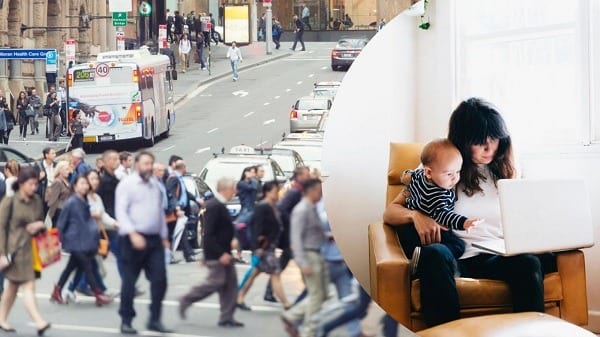But it’s not a legal requirement that Australians receive superannuation when they take paid parental leave, a policy setting Victorian Treasurer Tim Pallas has described as “outdated”.
The Victorian government is pushing for superannuation payments made to parents who access the Commonwealth paid parental leave scheme, as part of a larger suite of proposed superannuation reforms announced on Wednesday.
Australian women retire with an average $122,848, while their male counterparts retire with $154,453, the Association of Super Funds of Australia (ASFA) found in its July 2019 report.
And while women have lower super balances across all age bands, the size of the gap jumps significantly as women age into their 30s and 40s.
“Females tend to have slightly lower average account balances compared to males of similar age and income level, particularly after around age 45,” ASFA said.
“Breaks from paid work due to family responsibilities contribute to these outcomes.”
According to the Workplace Gender Equality Agency, 95.5 per cent of people who take employer-funded primary carer’s leave are women.
‘It’s grossly unfair’
It’s something FairVine’s head of customer experience Rachel Hamlen considers “grossly unfair”.
FairVine describes itself as a super fund designed for women, with a range of tools built to boost women’s super balances.
“There’s no reason why Australians on paid parental leave should miss out on super. In fact, it’s grossly unfair, and results in primary carers (who are most often mothers) missing out on a sizable chunk of retirement savings – particularly if they have more than one child,” Hamlen told Yahoo Finance.
“This oversight is one of many factors contributing to poor retirement outcomes for women, with other causes including the gender pay gap, disproportionate representation in lower-paying roles and industries, and longer life expectancies.”
She said implementing mandatory super payments during paid parental leave is “one of several things” that need fixing in Australia’s parental leave structure.
“[Our scheme] is actually behind the curve in many ways compared to other OECD countries. Our paid parental leave of 18 weeks for primary carers is well below the OECD average of 55 weeks.
“Further, it entrenches inequality in caring responsibilities by only granting the secondary carer two weeks of paid leave.
Australia’s failure
The inequitable implementation of superannuation has even caught the attention of the World Bank.
Australia scores 96.88 out of 100 on equality, the World Bank Women, Business and the Law 2019 study from the World Bank found, falling short in one area: pension equality.
The country is unable to answer yes to the question: “Does the law establish explicit pension care credits for periods of childcare?”
Women conduct 76 per cent of Australia’s unpaid childcare, with their work worth $345 billion, PwC analysis has found.
Essentially, as women take time away from the paid workforce, they’re not only losing the ability to earn an income, but to also contribute to their super.
On top of that, most Australian superannuation funds charge account fees on parents, regardless of whether they’re actually contributing to their fund.
“By missing just five years of work from age 29 to 34, the average woman is estimated to miss out on almost $100,000 of their potential retirement savings,” Industry Super has also warned.
‘The super system is set up to favour the lifecycle of men’
Australian woman Susan Wreathall learnt that lesson the hard way.
The 61-year-old told Yahoo Finance last year how she “can’t even conceive of retiring”, after spending 12 years out of the paid workforce to raise children, after 16 years where super payments weren’t compulsory.
“The superannuation system is definitely set up to favour the lifecycle of men rather than women. It rewards the high earners who work consistently throughout their lives, but being a productive member of society isn’t just about what you contribute in the workplace,” she said.
“Kids don’t raise themselves, and not all families have the luxury of being able to afford childcare so that both parents can work.
“It would be great if the superannuation system didn’t penalise the caregivers of society. The ones who give up their career to look after their family because there aren’t any other options shouldn’t be left to retire into poverty.”
This article was first published by Yahoo Finance AU and is republished here with permission.


